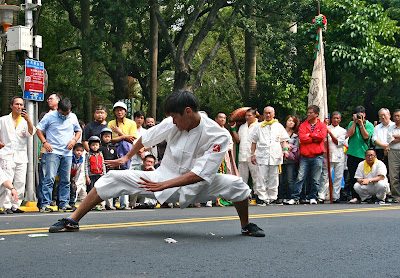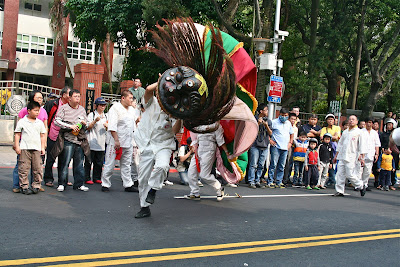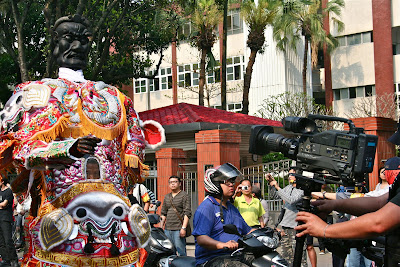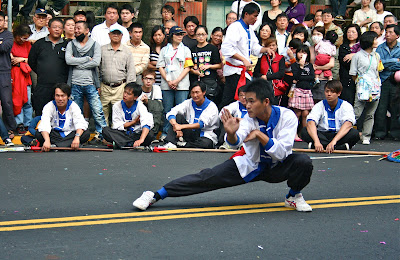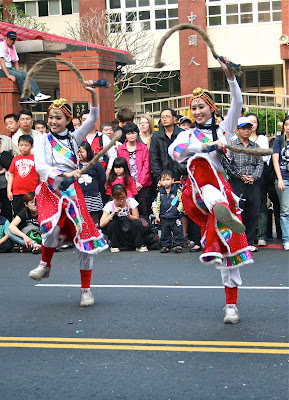I'm sure some of you have heard of the just-common-enough-to-be-noticeable practice of hiring dancing girls or strippers (or both) at certain functions in Taiwan: notably weddings, funerals (yes, funerals) and temple festivals.
Well, I came across some at the Baosheng Cultural Festival this weekend, and it got me thinking about an old topic that I thought I'd written about but actually haven't: is Taiwan as "conservative", or at least as sexually conservative, as people think?
There's no clear answer to this but I would put my bets on "no". Not just because of the "pole dancers for the gods" driving around Taipei on the back of retrofitted Jeeps, but for a number of reasons.
My New Life in Asia covered this awhile ago, and his post is worth reading. However, I feel it only covers one aspect of Taiwan's (lack of) sexual conservatism, at least compared to the rest of Asia. Which is good - keeping focus and all - but there's more to explore.
He focused mostly on women leveraging their sex appeal for financial gain, and businesses and marketing doing the same. And there's certainly truth to that: between booth babes, beer girls, betel nut beauties and the blatant hiring favoritism of attractive women over unattractive ones or, in some industries, over men (even attractive men), there's definitely less taboo centered around leveraging female sex appeal in Taiwan - to the point that it sometimes makes my feminist skin crawl.
And the pole dancing girls definitely fit that aspect of Taiwan's relative progressiveness, so I'll talk about them first.
I can't explain the "weddings and funerals" thing when it comes to hired dancing girls - and it doesn't happen all that often at either - but it's common enough at temple festivals that a few of my friends have come across it so far. Once at the Baosheng Cultural Festival, once at God Pig in Hsinchu - and I did see my share of scantily clad "baton girls" with marching bands at the Matsu pilgrimage kick-off.
But why? To quote one of my students: "they do that to show respect to the god. That god probably wants people to have more and more babies and this...helps. And the god should enjoy it too."
And certainly nobody seemed to disapprove - men and boys watching obviously enjoyed the show, but notably, they were doing so right in front of their mothers, wives, grandmothers, daughters and sisters, who also didn't seem to mind (some were even cheering - even grandmas). The dancing took place in front of temples and nobody thought this was declasse or inappropriate (although certainly among Taiwanese who don't commonly watch temple parades for fun, you'll find folks who do think it's declasse). The women certainly didn't think they were doing anything wrong or shameful.
That's significant - there's truth to the idea that whether you approve of it or not, the female body and its appeal does move product. Sex sells.
Until the human race evolves beyond finding sexualized marketing appealing, it's going to happen (just like any number of social ills: abortion, divorce, premarital sex etc.. There's no sense railing against it, because it's going to happen. You have to build your fight for a better world around accepting that fact). The pragmatism of just accepting that rather than wringing hands and clutching pearls, while bracing at times, can also be refreshing.
But there really is more to Taiwan's progressivism than that. So, here are a few reasons why I don't think Taiwan is as sexually conservative as people think, and is definitely not as sexually conservative as most of East Asia.
1.) Love motels -
In the USA they're seen as gross, seedy places where all sorts of nastiness goes down. And certainly Taiwan must have a few grody love motels. But ask most locals and they'll say there's nothing wrong with pay-by-the-hour "rest" establishments, that they're a social necessity in a country where people often live with parents until they marry, and often afterwards as well, or share smaller spaces with multiple generations. Maybe it's a boyfriend and girlfriend looking for somewhere to go when they both live with their parents, or a married couple who needs to get away from Grandma and the Kids, or a truck driver and a prostitute, an extramarital affair or just some kids looking to party. Who knows, who cares, it's nobody else's business and people respect that. And I love it - no moralizing, no soapboxes, no bible-thumping, just not your business, stay out of it, sex is a thing people have.
Thanks to my Christian Guilt (I was not raised Catholic but the guilt thing is very real), the first time Brendan and I (unwittingly) stayed at a love motel, I was a bit embarrassed walking outside (we'd realized it was a love motel after we checked in). It felt like I was on a reality show, looking around shifty-eyed: Who's Judging Me Now? Once I realized nobody was, it made me wonder why this wasn't how things were everywhere else in the world.
And they're openly advertised as such, in ways that could ostensibly point to both male and female desires: Secret Love Motel (advertised with huge LED signs off the main road - nothing too secret about it, ey?), Eden Exotica (home of the Batman Room!), I Need Motel etc. and pictures of hearts or, in one establishment's case in Yonghe, a man and woman making out. The woman sure seems to be into it. The fact that the signs can get that racy at all means that there's just not much of a big deal surrounding them. I could see such a place in the USA being picketed by angry evangelicals.
2 - Prostitution exists (DUH) but it's less acceptable to be a john...not because sex is wrong, but because "decent guys" do it for love.
I feel like in a lot of other countries (*cough* China *cough*), it's still a social "thing" that a man can both be a "decent guy" in the eyes of society, and be someone who visits prostitutes and playboys it up, even when he is in a relationship (assuming it's not an open relationship). It's like, the fact that that guy blatantly cheats on his partner is utterly irrelevant to whether he's a good guy - perhaps because more people think that all men do it, so there's nothing wrong with it and it's women's job to accept and forgive.
Setting aside whether it's OK to visit prostitutes (I err on the side of "no" just because of all the exploitation of women that goes on in that industry, including, if not especially, in Asia, but I'm not against a woman choosing to enter sex work if she chooses to), I feel like while Taiwan has its share of prostitutes (I wouldn't, as My New Life In Asia calls it, say "Taipei is a city of lust" though - it's about as lustful as any other city or even group of humans who live together in a society, no more and no less), that if a man wants to be seen as a "decent guy", a 君子, in society, that man can't (openly, at least) sleep around when he's in a relationship or married.
Note: I'm not including men who sleep around or visit prostitutes when single in this analysis, because that's a different discussion.
I know, I know. Some of you are going to say "doesn't that mean Taiwan is more sexually conservative, not less?" No. To me, that's a sign of progressivism, not conservatism because it includes a feminist perspective into ideas about sex. Openly breaking your romantic promises if you're a man (but not a woman!) is actually a symptom of a sexually repressive society, not an open one. A society in which sex shouldn't be enjoyed by women, and is entirely the privilege of men. That's not openness, it's the opposite! In an open society, that sort of behavior tends to decline because people are more likely to form happy, healthy relationships in which both partners are satisfied.
Oh yeah, and male escorts exist too.
3 - There's been an uptick in using male sex appeal in advertisements and media -
DONE.
OMG Takeshi.
I have heard that apparently 3G service slowed down significantly at Zhongxiao Fuxing MRT when this ad took up an entire wall, and that it was mostly due to women taking pictures of it and sending it to their friends or posting it on social media. That could be apocryphal, but I really hope it isn't. Because OMG Takeshi.
4 - Sex jokes are surprisingly acceptable, especially at weddings but even in other situations -
No really, you wanna hear about the time my friends got married and their friends stuck a banana between his legs and made her eat it? I don't really wanna talk about that time, but I can't imagine most people from a "conservative" country thinking it's OK to pull those stunts in front of someone's grandparents.
What's more, I've found that if I have had a student or group of students for a long time, and they make mistakes that sound hilariously dirty ("I asked her if she could do my English tutor", "I gave my wife a Wang Steak for Mother's Day", "My presentation is in three man parts", "Be careful or he'll knock you up" (they meant "knock you out"), "I like to take out my member to play on Friday night" (he meant he liked to go out with his team members), "My salary is too low, I think. My other friends have big packages but I have a small package", "We will have an oral contest next week to see who does the best oral" etc., I can usually just tell them why they can't say that, and it's wonderfully funny.
Plus you can buy these t-shirts and much, much more in terms of horrible things on clothing.
5 - Sex ed advertisements and pamphlets are much more "open" here than in the USA -
Some of you "enlightened topless Europeans" may disagree, but in the USA it's quite rare to see too many sex ed public service announcements, and how much of it you get in school differs by state. I know Taiwanese schools aren't great at this, but they seem to do a better job of it than any other country in Asia (correct me if I'm wrong), and I've definitely seen pamphlets like the above (nevermind the English - a workman must sharpen his tools if he is to do his work well indeed!) and TV ads on the MRT station TVs that show two cartoon lovers going to a motel, then the cartoon motel starts shaking, and there's an admonishment to wear protection.
Of course, there is a flip side to this - plenty of women don't seem to know how their anatomy even works ("if I wear a tampon, won't I lose my virginity? If I wear a tampon, won't I be unable to pee?") or think that sleeping in the same bed with a man carries a risk of pregnancy. This could definitely be improved.
6 - A majority of Taiwanese are either not opposed to, or actively support, marriage equality, family planning and reproductive freedom -
You don't really hear any objections to the use of contraception (except perhaps by in-laws who want grandchildren yesterday to carry on the Chen family name, because it's in danger of dying out or something), I've not really heard many people ever speak out against the legality of abortion (which is only covered by health insurance if done for certain reasons, but is legal) - at least, the dialogue never gets as vehement and sexist and downright hateful and shameful (on the part of certain conservatives) as it does in the USA, and recent surveys indicate widespread, even majority support for marriage equality.
I've never heard of a "conservative" society being mostly in favor of granting marriage rights to all.
Oh yeah, and support, at least in artistic form, for transgender people exists, too!
7 - There's been an uptick in PDA -
A lot of people writing about Taiwan write about how PDA just isn't done here, it's kind of rude to do that in public, whatever-whatever. I have to wonder what part of Taiwan they're in. Perhaps that's true in rural areas, but I see all sorts of PDA in Taipei - butt-touching on escalators, kissing, hugging, all that stuff. And then a few extreme examples that have attained national prominence, too, like this one, which produced some amazing viral meme material (known locally as "kuso", from a Japanese word), much of which you can find here, including the image above. Or the time a couple made the news for riding a scooter together, the woman sitting astride her boyfriend as he drove (clothes on) - can't find the link for that, but it happened.
8 - For every "using a hot girl to sell product" advertisement, there's another one either implying that their product will give you a big dong, or that guys with big dongs use that product -
I've been trying without success to find the link for some of these products - I don't exactly need them, seeing as I haven't got the organ in question, so hunting in English would be difficult enough. Can't find it at all hunting in Chinese.
But every time I take a taxi with a little TV in the back, there's this commercial where a guy in a blue shiny suit dances around happily until he goes to his girlfriend's house, and it's obvious what they're going to do. Then you see a cartoon blue bird wave at you before growing huge muscles - the product is basically some sort of male enhancement ("blue bird" is local slang for that particular appendage).
And let's not forget how readily available Chinese medicinal remedies are for men who need a little help.
9 - The Kaohsiung Sex cafe exists, yes, and even outside of it I have seen more depictions of sex organs (and underwear just dancing in the breeze, or worn outside by old guys) in Taiwan in 8 years than I saw in 24 years in the USA -
Just not sure I believe many people in a "conservative" country would hang their underwear to dry on an old placard carved with Chinese Nationalist slogans. For women's unmentionables, scroll through here.
10 - The slang. Oh, the slang.
Taiwanese swearing, when not referencing shit ("shit face", "shock you into shitting green", "Eat shit!"), references sex acts and sex organs far more than you'd think the language, even the dirty language, of a "conservative" country does. There's a slang term for "like throwing a sausage down a hallway" (the Taiwanese translates as "a stick of bamboo in the well"), the two worst insults out there are stinky (man parts) and stinky (woman parts), and an effective way to say that one is angry is to say "My dick is full of fire!", and of course the usual slew of slurs directed at one's mother, but that's true in every culture. I just don't see a "conservative" culture translating "I'm SO ANGRY" as "my dick is full of fire", I'm sorry.
11 - Well, as I said above, pole dancing for the gods. Not only is it totally normal, but the crowds in the street cheering on the pole dancers weren't just men of all ages, but women too.
12 - Magazines in 7-11 and Zhu Geliang movies -
Seriously, any kid or grandma can see this at the checkout at 7-11 (sometimes they put it in the magazine rack in back, sometimes they don't, or what's at the register is far racier).
Brendan disagrees with me about Zhu Geliang, whom I have most recently seen on an advertisement on the side of a bus for his new movie while a woman, ostensibly measuring him for inseam length, is actually measuring his man bits. In another movie, someone kicks him in said man bits and the shot cuts to two eggs cracking over a frying pan.
from here
I say that's a sign that Taiwan is not that conservative. Brendan says "well, it's really no racier than old Benny Hill movies. You know, sex jokes for our grandparents." But for me, the fact that softcore pornographic magazines are not only sold in 7-11, but are right there on the checkout counter where every child and grandma can see them, boobs out and everything, seals the deal. Every country has porn, but "conservative" ones don't put it right at the cash register.
Oh, and one of those magazines is called "Sexy Nuts", which I think is hilarious.
13 - Reproductive health and contraception are all easy to come by, and for women, everything but contraception is free (contraception should be free, but that's another post) -
"Conservative" countries don't provide free pap smears to women after age 30, nor do they make it extremely easy to buy condoms and birth control pills with no shame attached, no stealing about, no red faces.
* * *
Of course there's more work to be done. Abortion shouldn't only be covered for certain reasons, we need better education towards gender equality, contraception of all types should be available for all at an affordable price for all (see the comments of that post for more on that topic), sex ed in schools needs to be more comprehensive, and there are still folks out there who have old-fashioned ideas about what families should look like, who can be gay ("I don't care if some stranger is gay, but NOT MY SON!" is a common sentiment, but then that's true in the USA too), and how "pure" a woman should be before marriage (again, that's also common in the USA where slut-shaming is surprisingly common).
But overall, I would not say that I find Taiwan to be terribly conservative. I would not say I find it to have rigid, old-school morals. I'd say, if anything, it's the most progressive country in Asia vis-a-vis these issues and in some areas, can compete with the USA when it comes to open-mindedness.
After all conservative societies don't have very many protesters who make signs like this, and have their message get so popular that someone makes a series of stickers based on it to pass out to the public. Which happened. I have one.





















